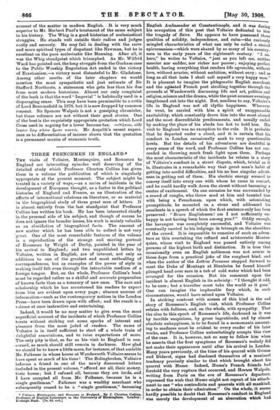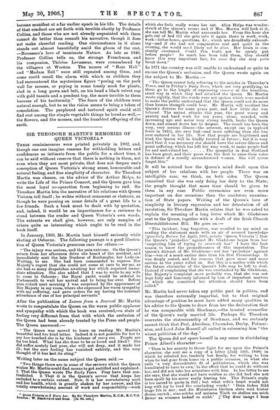THREE FRENCHMEN IN ENGLAND.*
THE visits of Voltaire, blontesquieu, and Rousseau to
England are interesting episodes well deserving of the detailed study which Professor Churton Collins has given them in a volume the publication of which is singularly "appropriate at the present moment. The subject might be treated in a variety of ways,—as a series of incidents in the development of European thought, as a factor in the political histories of England and France, as an illustration of the effects of international relations on literature, or as material 'in the biographical study of three great men of letters. It is almost entirely from the last standpoint that Professor 'Collins has Written his book. He has been interested chiefly in the personal side of his subject, and though of course he does not ignore the broader issues, his work is mainly valuable as an elucidation of biographical facts. The amount of new matter which he has been able to collect is not very 'great. One of the most remarkable features of the volume is a reproduction of the strange and moving portrait of Rousseau by Wright of Derby, painted in the year of his arrival in England ; and two unpublished letters by Voltaire, written in English, are of interest, not only as additions to one of the greatest and most enthralling of correspondences, but as examples of the power of style in making itself felt even through the intractable medium of a foreign tongue. But, on the whole, Professor Collins's book must be regarded rather as a skilful and accurate preparation of known facts than as a treasury of new ones. The care and scholarship which he has accustomed his readers to expect 'from him are evident upon every page ; obscure sources of . information—such as the contemporary notices in the London Press—have been drawn upon with effect ; and the result is a volume at once instructive and entertaining.
- Indeed, it would be no easy matter to give even the most ' superficial account of the incidents of which Professor Collins treats without striking out some sparks of interest and pleasure from the most jaded of readers. The name of • Voltaire is in itself sufficient to start off a whole train of delightful associations, and to raise expectations of more. The only pity is that, so far as his- visit • to England is con- • earned, so much should still remain in darkness. How glad we should be to know a little more, for instance, of that amiable Mr. Falkener in whose house at Wandsworth Voltaire seems to have spent so much of his time ! The Bolingbrokea, Voltaire informs a friend in one of the newly discovered letters . included in the present volume, " offered me all, their money, their house; but I refused all because they are .lords, and I have accepted all from Mr. Falkener, .because he is 'a single gentleman." Falkener. was a wealthy merchant who subsequently ceased to be a "single gentleman,". becoming
,• Vollaiee, Mordesqoaeu, and Rousseau in Xnglond.. By .7. churton Professor of English Literature iu the University of Birmingham. 'London: Eveleigh Nash. "[7s. 01 net.] English Ambassador at Constantinople, and it Was during his occupation of this post that Voltaire dedicated to hint the tragedy of Zaire. He appears to have possessed those qualities of solidity, independence, and calm—the curiously mingled characteristics of what can only be called a stoical epicureanism—which were shared by so many of his country. men in the early years . of the eighteenth century.' "I an, here," he writes to Voltaire, "just as you left me, neither. merrier nor sadder, nor richer nor poorer ; enjoying perfect health, having everything that renders life agreeable, without love, without avarice, without ambition, without envy ; and as long as all that lasts I shall call myself a very happy man." It is pleasant to imagine the phlegmatic English merchant and the agitated French poet strolling together through the grounds at Wandsworth discussing life and art, politics and religion, science and the drama, while the quiet summer evenings lengthened out into the night. But, needless to say, Voltaire's life in England was not all idyllic happiness. Wherever he went, he carried with him a spirit of unappeasable excitability, which constantly drove him into the most absurd and the most discreditable predicaments, and usually ended by making the place of his abode too hot to hold him. His visit to England was no exception to the rule. It is probable that he departed under a cloud, and it is certain that his conduct in London occasionally sank to very questionable levels. But the details of his adventures are doubtful in every sense of the word, and Professor Collins has not suc- ceeded in throwing much fresh light upon them. Perhaps the most characteristic of the incidents he relates is a story of Voltaire's conduct in a street dispute, which, trivial as it is, illustrates in a remarkable way that great man's habit of getting into sordid difficulties, and his no less singular adroit- ness in getting out of them. His electric energy seemed to convey itself into every one with whom he came in con;.act, and he could hardly walk down the street without becoming a centre of excitement. On one occasion he was surrounded by a crowd of roughs, who threw mud at him and taunted him with being a Frenchman, upon which, with astonishing promptitude, he mounted on a stone and addressed his assailants in a speech of which the first sentence only has been preserved: "Brave Englishmen! am I not sufficiently un- happy in not having been born among you ?" Oddly enough, the harangue was completely successful, and Voltaire was eventually carried to his lodgings in triumph on the shoulders of the crowd. It is impossible to conceive of such an adven- ture as this overtaking the refined and aristocratic Ideates- quieu, whose visit to England was passed entirely among persons of the highest birth and distinction. It is true that occasionally even an English nobleman was not averse in those days from a practical joke of the roughest kind, and when the author of the Lettres Persanes stepped forward to meet the Duke of Montagu at Blenheim he found himself plunged head over ears in a tub of cold water which had been arranged for the occasion. But his comment upon the incident is almost English in its sobriety : "I thought it odd, to be sure ; but a traveller must take the world as it goes." One can imagine the implacable fury which, in such circumstances, would have seized upon Voltaire.
In striking contrast with scenes of this kind is the sad story of Rousseau's English visit, which Professor Collins relates with fullness, and, on the whole, with sympathy. That the clue to this epoch of Rousseau's life, darkened as it was by terrible 'suspicions, by gross ingratitude, and by almost absolute unhappiness, is to be found in a monomania amount- ing to madness must be evident to every reader of his later works, and Professor Collins unhesitatingly accepts this view of the case. It is, however, not so easy to follow him when he asserts that the first symptoms of Rousseau's malady did not make their appearance until after his arrival in London. Many years previously, at the time of his quarrel with Grimm and Diderot, signs had disclosed themselves of a maniacal tendency precisely similar to that which brought about his quarrel with Hume. Indeed, Hume's French friends had foretold the very rupture that occurred, and Horace Walpole, writing from Paris on the eve of Rousseau's departure, expressed the wish that Hume might not repent of his attach- ment to one "who contradicts and quarrels with all mankind, in order to obtain their admiration." On the whole, it seems hardly possible to doubt that Rousseau's conduct in England .vas merely the development of an aberration which had
becioine manifest at afar -earlier_epoch in his life. The details a Mitt conduct are set forth with terrible clarity by Professor Collins, and those who are not already acquainted with them cannot do better than consult his narrative, though it does not make cheerful reading. One circumstance in it alone stands out almost beautifully amid the gloom of the rest, —Rousseau's love of inanimate Nature. As late as 1840, Professor Collins tells us, the strange Frenchman, and his • companion, Therese Levasseur, were remembered. by the Villagers at Wooton. The 'names of "Rosa " and "Madam Zell.' were still repeated among them, .and some could recall the alarm with which as children they had encountered the mysterious figure "Poring on the park wall for mosses, or prying in some lonely _nook for plants, clad in a long gown and belt, on his head a black velvet cap with gold tassels and a pendent top, the more terrible to them because of his taciturnity." The fears of the children were natural enough, but to us the vision seems to bring a token of consolation. The perplexed and tortured spirit could still find rest among the simple vegetable things he loved so well,— the flowers, and the mosses, and the humblest offspring of the earth.







































 Previous page
Previous page